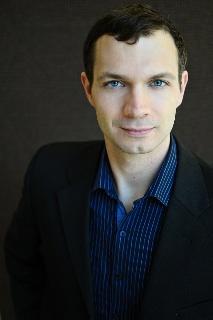Performance Audio
Sean McCarther, baritone, performs Franz Schubert: Des Fischers Liebesglück
Rachelle Jonck, piano
About
Baritone Sean McCarther is Professor of Music Theatre at Rider University, where he serves as the Musical Theatre Voice Coordinator, stage combat choreographer, and intimacy consultant. He teaches classical, musical theatre, and popular voice, voice science, and movement for performers. He received his doctorate in Vocal Performance and Pedagogy with minors in music theory and movement/postural analysis at Indiana University. He studied voice with Dr. Robert Harrison and pedagogy with the late Paul Kiesgen. Dr. McCarther earned his Master of Music degree with an emphasis in speech pathology at Indiana University and his Bachelor of Music degree at Baylor University, where he studied with Jack Coldiron.
An advocate for physical theatre and mobile singers, Dr. McCarther has created a movement-based performance pedagogy that helps students learn to actively engage their environment, their scene partners, and the audience with the highest potential expression. He teaches a three-semester sequence as part of the BFA Acting curriculum and is a frequent guest clinician on the topics of consent, intimacy and staged violence. He is an advanced actor combatant with both the Society of American Fight Directors and the Academy of Fight Directors Canada and has trained with Intimacy Directors and Coordinators and Theatrical Intimacy Education. He has choreographed violence and intimacy for numerous plays, musicals, and operas both at Rider University and in the surrounding area. Some of his violence and intimacy choreography credits include She Kills Monsters, Spring Awakening, Oklahoma, Polaroid Stories and Hamlet.
As an academic, Dr. McCarther’s research interests include voice pedagogy, movement, performance psychology, motor learning, theatrical emotion, and consent and creating safe theatrical space. He has multiple peer-reviewed publications on these topics and has presented podium presentations regionally, nationally, and internationally at conferences such as the NATS National Conference, the 10th International Congress of Voice Teachers in Vienna, the United Kingdom’s Association of Teachers of Singing Virtual Conference, and the 2nd Chinese Kodaly Seminar in Beijing. He has contributed chapters to several books on the topics of performance psychology and the intersection of choral and vocal pedagogy.

